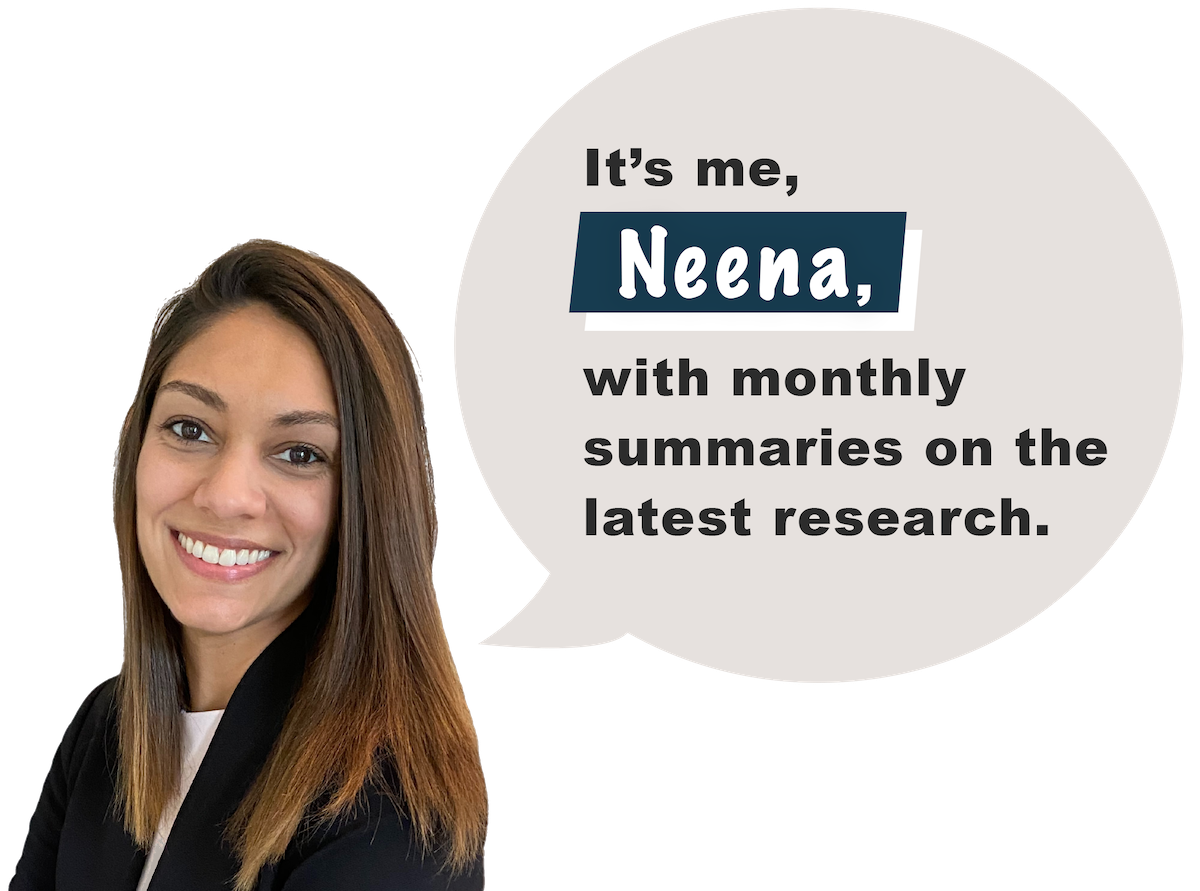 Welcome to the Reading Research Recap!
Welcome to the Reading Research Recap!
I am Dr. Neena Saha, Research Advisor at MetaMetrics and founder and CEO of Elemeno, now a part of MetaMetrics. My focus is to bridge the research-practice gap so that educators can access real-time tools to support reading success. To expand the understanding of research to inform teaching and learning strategies, I put together this monthly compendium of the relevant and must-read research that impacts the reading and learning landscape. I offer research highlights in digestible summary slices. Hopefully, the data and findings you see here are useful to you as researchers, educators, and district and edtech leaders.
Where do struggling readers end up after high school?
Hi everyone!
This month I strayed a bit, and instead of covering my usual RCTs, Metas, or experiments, I chose this paper, because it touches on “the why”: What Are the Long-Term Prospects for Children With Comprehension Weaknesses? A Registered Report Investigating Education and Employment Outcomes.
Background
We kinda know intuitively that struggling readers might have less than favorable outcomes compared to their typical-reading peers, but few studies have actually tracked outcomes past compulsory education (i.e. into early employment or higher education). I liked this study because it did just that!
Rationale
While there are many longitudinal studies examining outcomes of students with reading difficulties, many are small scale, few focus on students who struggle with comprehension difficulties (vs. word reading difficulties), and few follow students all the way into their 20s, examining their employment outcomes.
Methods
This study followed 6846 students in the UK who were identified as typical readers (no reading struggles) or as having comprehension or word reading difficulties at age 9 (mid-childhood). (Note that the data used in this study was from the Avon Longitudinal Study of Parents and Children; ALSPAC).
Educational achievement data (such as national test scores and grades) were tracked for all three groups, as well as a survey was sent out to examine their academic or employment status at age 20.
Socio-demographic variables such as maternal education as well as free school meals were also collected to see how SES influences outcomes.
Results
National Test Outcomes in School
- Typically developing readers were 2.38x more likely to meet or exceed national targets on national assessments than students with comprehension difficulties (and children with comprehension difficulties performed comparably to children with word-reading difficulties)
- Interestingly, students with comprehension difficulties performed worse on Science and Math national tests than English (this ran counter to the researchers’ hypothesis)
National Targets Upon Leaving School
- Typically-developing readers were 33% more likely to meet national targets than those with reading weaknesses.
- On the school-leaving assessments (when compulsory education ends), there were no significant differences between the students with word-reading difficulties vs. comprehension difficulties, but not surprisingly, both groups were below their typically-reading peers.
Employment Outcomes
- Children with comprehension difficulties were the most likely group to not be in higher education or employment at age 20 (9.34% of respondents), followed by those with word reading weaknesses(7.84%), followed by typically-reading peers (6.55%)
- Children with comprehension difficulties were 43% more likely to not be in higher education or employment at age 20 compared to their peers
- But, importantly, differences were not significant after controlling for socio-demographic factors, which means that (proxy) variables for SES like maternal education and free school lunch are really important!
Take-Home Message & Practical Implications
- Struggling readers have less positive outcomes on national tests and are less likely to be employed or in higher education at age 20.
- The authors also make the point that children with comprehension difficulties have just as poor outcomes as those with word reading difficulties but they are less likely to be identified.
- Since teachers cannot directly influence SES, it is really important to identify and address reading difficulties in the early grades via appropriate assessments and explicit instruction!
**If you are interested to see my key takeaways and highlights from The Reading League Annual Conference, be sure to watch the YouTube Vlog version of the blog!**
Teacher Education, Legislation, Policy, Professional Development, Etc.
- Comprehensive early literacy policy and the “Mississippi Miracle”
- What’s Hot in Literacy: Misguided Trends in a Divided Field
- The Struggle with Aligning WIDA-Based ESOL Programs to the Science of Reading: A Call to Action for WIDA (commentary, not peer-reviewed)
- How Principals Make Sense of Tensions While Leading a Teacher Professional Learning Initiative: A Case Study of a Districtwide Science of Reading Implementation
- Teachers’ Feedback on Oral Reading: A Critical Review of its Effects and the use of Theory in Research
- Do early school- and family-related factors predict midlife psychological well-being? Findings from A prospective Black childhood cohort study
- Feedback to diverse language learners: Where are we and where do we need to go in literacy research? An introduction to the Special Issue on Literacy and Feedback
- The role of teacher–child relationships in kindergarten on children’s motivation and reading skills in grade 1
- Exploring Professional Development’s Influence on Teacher Beliefs in the Science of Reading (Dissertation, not yet peer-reviewed)
- Louisiana Teachers’ Experiences of Instructional Strategies for Improving Literacy Skills of K-3 Students (Dissertation, not yet peer-reviewed)
- Leveraging Professional Learning to Support Teachers’ Use of a Comprehensive Literacy Curriculum (Dissertation, not yet peer-reviewed)
Dyslexia, Struggling or At-Risk Readers
- Do the Special Education Regulations in States Requiring RtI for SLD Identification Include or Omit Intervention Fidelity?
- Explainable AI in Handwriting Detection for Dyslexia Using Transfer Learning
- Grades 2–4 Teachers’ Experiences Remediating Learning Loss in Reading (Dissertation, not yet peer-reviewed)
- Working memory training in students with dyslexia: Additional effects to reading and spelling remediation not likely
Phonological Awareness, Phonics, Word-Reading
- Set-for-Variability Predicts Responsiveness to Tier 2 Reading Interventions (In press, Scientific Studies of Reading)
- Bridging the Literacy Gaps: Examining the Impact of the Morphoread Intervention on the Reading Achievement of Children From Low SES Backgrounds
- Evaluating the Reliability of Name Writing Rubric Scoring
- An Analysis of Word/Sound Boxes and Their Effects on Basic Literacy Skills
- Read STOP Write: Teaching foundational skills in a multicomponent informational reading and writing intervention
- Developing Multisyllabic Decoding and Encoding Skills with Upper Elementary Learners: Reporting Two Cycles of Design-Based Research
- Phonological skills and executive functions: their effects on reading and arithmetic abilities across varied performance levels using quantile regression
- Comparing Implicit and Explicit Morphological Analysis Instruction for Upper Elementary Readers
- The Dynamics of Behavioral and Neural Entrainment Predict Word Decoding and Reading Fluency (Dissertation, not yet peer-reviewed)
- Kindergarten Through Third Grade Classroom Teachers’ Use of Technology to Support All Students’ Reading Development (Dissertation, not yet peer-reviewed)
- Phonics Instruction, Phonics Small Groups and Guided Reading Groups: A Resource Guide for
- Teachers (Master’s thesis, not peer-reviewed)
Improving Tier 2 Literacy Interventions in the Primary Classroom: A Focus on Phonics (Master’s thesis, not peer-reviewed)
Dyslexia, Specific Learning Disabilities, At-risk or Struggling Readers
- Beyond Reading: Psychological and Mental Health Needs in Adolescents with Dyslexia
- The Prevalence of Specific Learning Difficulties in Higher Education: A Study of UK Universities Across 12 Academic Years
- Efficacy of Small Group Reading Intervention for Grade 2 and 3 Children with Reading
- Difficulties: A Cluster Randomized Controlled Trial (In press, Journal of Learning Disabilities)
Fluency
- Effects of a Classwide Reading Intervention on Reading Fluency and Comprehension of Content Area Text with Students in Middle School (In press, Journal of Educational Research)
- Modeling Growth in Reading With Curriculum-Based Measurement Versus Computer-Adaptive Tests
- Developing Linguistic Constructs of Text Readability Using Natural Language Processing
- Peer assisted learning strategies – UK (PALS-UK): a whole class reading approach – evaluation report. Project Report.
- Trend Analysis of Fluency-Related Research Articles: Using Data Mining
- The impact of integrating Microsoft Teams – Reading Progress as an Artificial Intelligence (AI) platform for promoting learners’ reading aloud skills
- Children’s Reading Self-Efficacy: An Exploratory Study on the Influence of Dog-Assisted Reading Programs (Masters Thesis, not yet peer-reviewed)
Comprehension
- Reading Comprehension Instruction: Evaluating Our Progress Since Durkin’s Seminal Study
- Unpacking automaticity: Scaffolded texts and comprehension
- Emotional intelligence and reading comprehension: Examining mediating roles of word reading, vocabulary, and working memory
- Behavioral Engagement Mediates the Relationship Between Main Idea Summarization and Multiple Document Comprehension
- Which is more difficult? Reading or Listening?
- Cattell-Horn-Carroll Cognitive Predictors of Performance on Two Distinct Measures of Reading Comprehension (Dissertation, not yet peer-reviewed)
Other
- A Meta-Analysis of Fidget Devices as Academic and Behavioral Interventions
- Opportunities and obstacles: Using profile analysis to examine sources of reading self-efficacy in early adolescence

Want to start receiving monthly notifications for this series?
Create or log in to your Lexile® & Quantile® Hub account. Once logged in, navigate to your account to update your mailing list preferences.
 Speaking of the Lexile & Quantile Hub — Exciting news!
Speaking of the Lexile & Quantile Hub — Exciting news!
A completely new version of the Lexile & Quantile Hub is here! The redesign features a streamlined user experience and enhanced accessibility to support a range of abilities.

